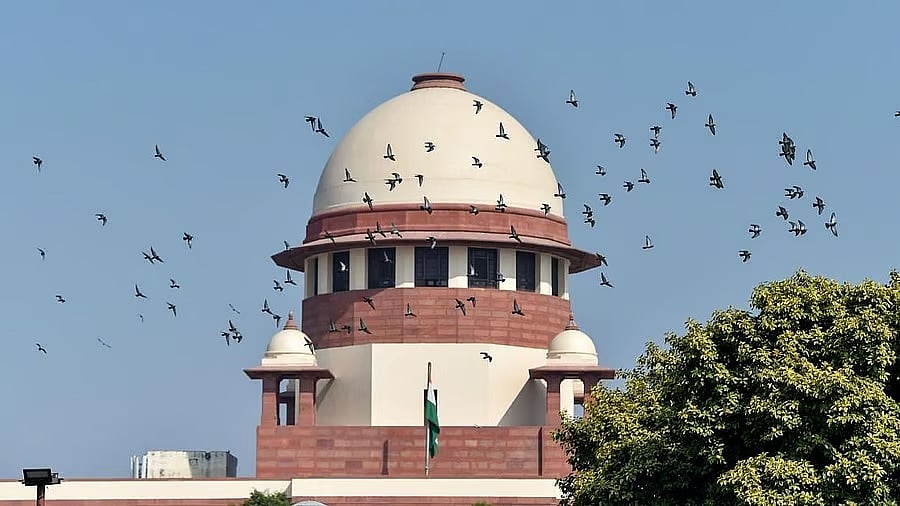
Supreme Court of India
Credit: PTI photo
New Delhi: The Supreme Court on Tuesday sought to know what would be the consequences if the President or the Governors do not follow the timeline for clearing Bills as fixed by this court in its judgment on April 8, 2025 in case of Tamil Nadu. The court also expressed doubts over the power to fix straitjacket timelines in case of all Bills.
The apex court also clarified it is not going to decide the matter on the basis of which political dispensation is in power or was in power. The court said it would only interpret the Constitution and not go into specific instances.
During the sixth day of hearing in the Presidential reference case, a five-judge bench led by Chief Justice of India B R Gavai asked, "Can the Governor or the President be hauled up for contempt of court, if the Bills are not cleared in terms of timelines?"
To this, Tamil Nadu government, through senior advocate Abhishek Manu Singhvi replied that "deemed assent" to the Bills can be a consequence.
The court also said that certain instances of delay in granting assent to Bills cannot justify the laying down of a blanket timeline for the Governors and President to act as per Articles 200 and 201 of the Constitution respectively.
The bench asked if the court can lay down a straightjacket formula for exercise of the power by the Governor and the President by exercising power under Article 142 of the Constitution.
"If there are individual cases of delay, the aggrieved parties can approach the court to seek relief, and the court may direct that the decision should be taken within a time limit; however, it cannot mean that the court should lay down a general timeline for the actions of the Governor and the President," the the bench said.
Singhvi contended that the timelines were necessary in view of the repeated instances of Governors withholding Bills indefinitely.
Singhvi said that 'killing' of Bill is available only to the cabinet and nobody else. "It can't be a by Governor. This court will have no scheme of Constitution left (if that is allowed)," he said.
The counsel further contended that a Governor cannot be the final arbiter of a Bill.
"Governor cannot withhold assent, kill a bill or be a judge in this. He is not the final arbiter or the Super Chief Minister. Ultimately, alleged unconstitutional Bills are passed everyday and courts will decide that. Even if majority introduced it, courts will see it.. that is separation of powers," he said.
During the hearing, the bench, also comprising Justices Surya Kant, Vikrant Nath, P S Narasimha and Atul S Chandurkar, also questioned whether court can grant deemed assent for Bills not acted upon by the Governor.
"This court can just get into the shoes of the Governor and consider all three options the Governor has," the bench asked.
Singhvi, however, said if the Governors and the President are exempt from judicial review, then their jurisdiction of power is stretched beyond limits.
He maintained Article 200’s structure is amenable to timelines. "The Governor is to take a decision within a reasonable time period," he said.
On this, the bench said, there could be different factual considerations in different cases and asked how there can be a same timeline for all Bills.
The bench also expressed doubt over the court's power to fix timelines for the Governor.
Singhvi argued that the timelines -- set by the SC -- were necessary in view of the repeated instances of Governors withholding Bills indefinitely.
The bench observed that laying down a general timeline will practically amount to the court amending the Constitution, since Articles 200 and 201 do not specify any timeline. "We will have to amend the Constitution to impose the timelines," the bench said.
Singhvi said that if the State has to approach the court every time the Governor refuses to act on the Bills, it will only add to the delay.
The hearing in the matter would continue on Wednesday.
During the day, the bench also said, “We are not going to decide the matter on the basis of which political dispensation is in power or was in power".
Solicitor general Tushar Mehta, representing the Centre, said if Singhvi is going to rely on examples of constitutional provisions which concerned Andhra Pradesh, among others, then he would have to file a reply, as he had not made submissions on those aspects.
"If they (Tamil Nadu and Kerala governments) are going to rely on examples of Andhra Pradesh etc, we would like to file a reply on this. Since, we need to show how the Constitution was taken on a joyride since its inception, let us see if we want to travel down that dirty path," Mehta said.
The bench made it clear that the court would refrain from going into individual instances whether it's Andhra Pradesh or Telangana or Karnataka, and stressed that it will only interpret the provisions of the Constitution.
The court told Singhvi, "You can say endless withholding is not permissible, why should we go into the facts…otherwise we have to listen what happened in 1977, 1975, and all that…we do not want it to be converted into a political (slugfest)”.
The bench stressed that it will only interpret the Constitution. “Our decision is not data based. Our decision is on questions of law interpreting the Constitution,” the bench said.
